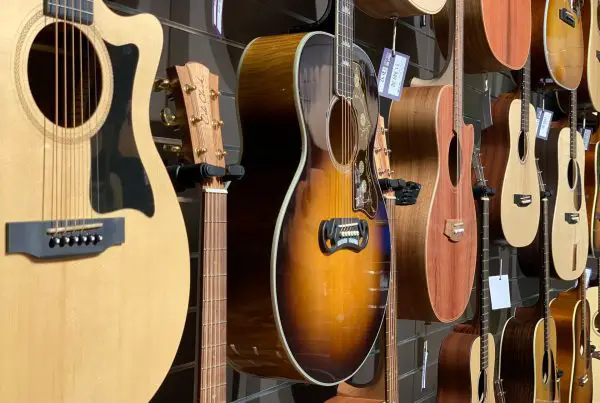If you play electric guitars, you might be wondering why it has a thinner neck compared to other guitars, and that might be something to research upon. There must be some reasons behind such a design right? Well, you are right. There are some reasons why electric guitars have thin necks.
Electric guitars have thin necks as string bending is much easier with such guitar necks. Thin necks also provide more movement for the fingers and that is the reason that musicians with metal and jazz music styles prefer guitars with thin necks.
Moreover, you can also play complicated note sequences easier with thin neck guitars.
Thinner necks are also known as faster action necks. It becomes much easier to manage the fretboard with a narrow neck. There are a variety of guitars available in the market, each with different neck width, but choosing the right size depends on the music style of a person.
In this article, I will go through in more detail why thin necks are more desirable (especially for electric guitars) and whether or not neck thickness impacts tone.
Are Thinner Guitar Necks Easier to Play?
Generally, thinner guitar necks can be easier to play for a lot of people – this could depend on the playing style and hand size.
If you have small hands, thinner guitar necks are easier because you can wrap your hands around it and perform techniques like bends.
Moreover, if you want to play jazz or metal music, thinner guitar necks are considered much better for them – due to the need of bending, sliding and shredding which are easier to do with thinner necks.
Many beginners start with thin guitar necks as it is easier for them to learn to play different chords with them. People with short fingers find it hard to practice on guitars with wide necks. People who want to shred can easily do it with a thin guitar neck.
However, it is all about subjective feeling, some people like wide necks, some thin. People who have small hands and fingers can easily get a grip on thin guitar necks, but people with big hands and fingers can go along with thicker guitar necks too.
Also Read: Thin VS Thick Neck Guitar: Playability & Tone Difference
4 Reasons Why Electric Guitars Have Thinner Necks
You would have noticed that electric guitars come with thinner necks, but most of us are unaware of the purpose behind them. Here are the reasons why electric guitars have thinner necks;
1. Complicated note sequences become easier

As electric guitars are sometimes used for complicated note sequences, they are designed with thin necks which makes it easier for the guitarists to play such note sequences. Electric guitars are the best for tapping style.
2. Easily bend string

Thin guitar necks are designed to facilitate better string bending. You need a significant amount of force to bend the strings properly to get the sound you want, and with a wide neck, it becomes hard to apply such force. String bending is a crucial part of playing the guitar, primarily when talking about electric guitars.
3. Suitable for metal & jazz music styles

As the majority of people who play electric guitars prefer metal and jazz music styles. The people who want to shred or solo at speed prefer thin guitar necks, as it makes it easier for them to adjust to their music styles. Metal and Jazz music styles require immense shredding and thin guitar necks are a blessing here.
4. Majority’s preference

People who are fond of buying electric guitars mostly prefer a thinner guitar neck, as it matches their music style. The market has a huge influence in the manufacturing of neck styles and to accommodate the demand of people, modern electric guitars come with comparatively thinner guitar necks.
Does Guitar Neck Thickness Affect Tone?
Guitar neck thickness does affect the tone. The thicker the guitar neck, the greater the stiffness, and more stiffness results in fewer vibrations. The impact of the neck thickness on the tone can be minimal but it exists for sure.
Guitar necks with high mass or more width are responsible for producing lower resonant frequency, and you get a darker sound, which is noticeable sometimes.
Thinner necks are usually credited for producing comparatively lighter sounds, but the effect is not too much. Thicker necks also produce louder and fuller tones. However, if you are looking for a snappier sound, a guitar with a thin neck can be of significant use.
This is the reason that guitars with different neck thicknesses are used in diverse music styles. Players who want amplified sound can choose thicker necks, but the ones who prefer lighter sound can select narrow guitar necks.
That said, guitar necks don’t impact the tone as much as the guitar body. Here are my other articles that you maybe interested when it comes to what impact guitar tone:
- How Does Guitar Body Affect Tone: Thickness, Wood & Size
- Do Different Guitar Cabinets Matter? Impact To Tone & Volume
FAQs
Is an Electric Guitar Neck Thinner Than Acoustic?
Electric guitar necks are thinner than acoustic ones because they are responsible for lighter gauge strings as compared to acoustic guitars. Even though electric guitar necks also come in different sizes, they are still comparatively thinner than acoustic ones.
As electric guitars also have an adjustable truss rod, it slims down the neck. A guitar neck is a major component that can affect or break the capability of an instrument and this is the reason that each instrument is designed accordingly.
However, the difference is not too much, some acoustic guitar necks only have a difference of an inch or less when compared to electric guitar necks.
Why Do Classical Guitars Have Wider Necks?
Classical guitars have wide necks to allow the player to press down each string properly without touching other strings on the board.
Moreover, wider necks are responsible for increasing vibrato which is known to be a highly popular effect in classical music.
When playing classical music, it is important to attain as much vibration as possible in the tone, and wide necks can do it easily.
Fast musical pieces require the swift movement of fingers. Classical guitars have a wider fretboard when compared to electric guitars. The distance between each string plays an important role in fingerpicking.





